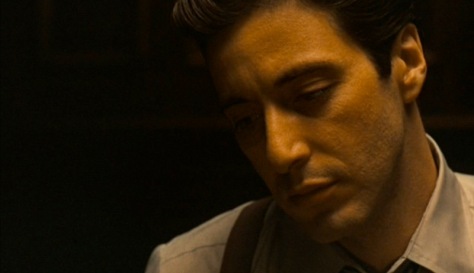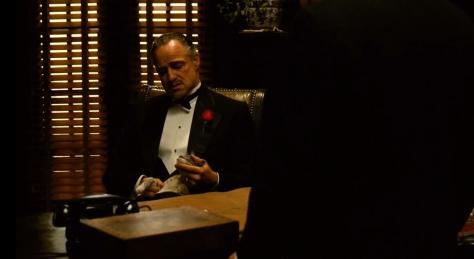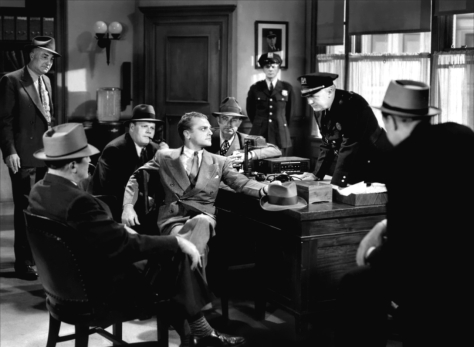
Badlands is a razor sharp dissection of youthful arrogance taken to its extreme, succeeding due to its humanizing and detailed look at its main character. The film originally seemed to be primarily about the dangers of those wanting to take advantage of underage girls, with the scenes having a rhythm of the leads trying to find safety for themselves, then something always going wrong. The first scene of the runtime is of Holly, played by Sissy Spacek, discussing a potentially traumatic childhood experience that may disorient her as to what is or isn’t normal. Crucially, her and her father suddenly move. While Holly’s dad, like many others, is a bit stubborn and protective, Kit, played by Martin Sheen, offers her additional support. This is shown in the fish scene. Regardless, he is quick to set off red flags, like faking signatures. The story gets a lot more interesting when Holly becomes a little older, having a more nuanced view of what’s going on, while still being childlike. She is a very important character for the development of the themes, characterized by many moments like her awkwardly delivering a joke she probably read in a magazine, as if trying to acclimate herself to her surroundings as much as possible and make what she can out of it from a staged source.
Kit is a troubled and multi-layered role, acting realistically like an extreme example of youthful rebellion and overconfidence. He is constantly characterized by small absurdisms that prove how little thought he’s put in his behavior, not unlike how a child might follow what they want without considering the consequences. One example is his rudimentary home and defense mechanisms, put together in a way that’s not sustainable in the long term or even that effective in the short. Another is that at a point where he should carefully consider his options, he leaves his decision up to pure chance. Logically, his behavior continues to make no sense, with his extreme thoughtlessness very compelling, possibly due to it making him vulnerable to the audience. Despite the movie featuring narration from only Holly, we learn so much about Kit, including his contradictions or otherwise strange lines of logic which seem forced to justify his impulse behavior to himself. He shows disdain for bounty hunters that doesn’t extend to the police, but he later treats the police with the same disrespect. He is also misogynist, probably as that’s the only way he can justify how little agency or freedom he gives Holly, due to him trying to live his own fantasy.
Kit is both unpretentious and uncertain of himself. What is suggested is that his behavior might be desirable to many people and the difference between them and him is that he doesn’t have the ability to comprehend how untenable his choices are and he lacks an ability to empathize. He wants to be cared about and take what he wants. His decisions follow those goals, with little more to consider. Just like how Kit doesn’t seem to understand his own behavior, neither does Holly. She treats everything like a strange adventure that doesn’t have much real value or impact. She discussed Kit like he’s a fictional character or someone unrelated to her, whose attributes are described as descriptions instead of beliefs that might be intended to inform her on a way of thinking. Her barely involved attitude makes for a very compelling contrast to the “act for the sake of acting” Kit, with some of the finest moments of the film coming from when Holly metaphorically reaches the point where he does become “real”, with her not knowing anything better to do than just be direct, like how Kit had been when describing his wants or actions.
The many wide shots of terrain give the sense of endless possibilities and are nice to look at, though overtime they seem more and more fruitless and flat. The ground leads to everywhere, but it is not in and of itself anything, and feels endless. Due to a few methodical scenes followed by a fast action, the film manages to shock you by first giving the audience uncertainty or numbing them with more mundane scenes that also tell us about the leads or the world they’re in before something happens. This is helped by the score, which shows us how they feel due to the tropical tone, like we’re watching some light escapade, which creates a brilliant surreal atmosphere that makes the story feel not real.
A fairly common issue with these sorts of movies is the characters falling in love very quickly without seeing much of why. Considering the tight and snappy pace of the story, it is probably for the best to not have had more scenes of the leads bonding. A potential work around for this would be for the movie to start with the two already dating. Another minor complaint is that the mumbling of the characters, while there for a reason, means it is sometimes really difficult to hear what’s being said.
SPOILERS
One of the most heart wrenching scenes of the film is when Kit unexpectedly and brutally shoots Holly’s dad, like the act is nothing. One of Spacek’s strongest moments is when she asks if he’ll be okay while watching his lifeless body. One of Sheen’s best is of his face painted with disbelief that he did that. He tries to keep a calm and tempered attitude over the killing, probably to keep Holly from getting upset, but also due to not knowing what this says about himself. He even says to her he’s fine with her calling the police, partially realizing that what he’s done is wrong and not trusting himself to make the right decision. After this we get him cooking up a convoluted scheme that has no way of working, like he has found some way to justify his actions as a coping mechanism. The destruction of youth for Holly continues with the long shots of her house burning down, including her toys and pictures.
One initially confusing part details Holly walking with a woman to where Kit wants them, with them not knowing what he will do with his gun, the woman possibly thinking he’ll kill her and the man she’s with. Her demeanor is surprisingly calm. However, the quiet and conversational leads might be giving them hope that if they are simply non-aggressive they’ll be allowed to live. You can also hear her holding back tears, not being entirely calm. This scene also shows how in a moment of panic, destruction can come in rapid succession, with Kit trying to solve all his issues with his gun, though getting sloppier and sloppier with how he’s using it. It is not unlikely that the couple survived their murder attempt.
It progressively becomes less apparent to the leads and the audience why they’re even running away from the authorities other than out of a force of habit. You see Kit start to realize this when he doesn’t kill someone he told an obviously suspicious lie to. There would be no reason to kill him logically, though it could be justified to Kit as preventing a witness from causing trouble for them. Of course, the pointlessness can also be applied to his other victims. The difference is that the earlier ones were done when the sense of love and adventure Kit had was stronger. There’s a fine scene of the two dancing in pitch black to a song about a love that’s ended, like our lead is celebrating his dark and horrible journey before it stops being fun and ends, with some understanding it will. This comes to a breaking point when Holly decides to stop going with him. As an aside, we see his face up close right before she says she isn’t going to go with him, letting us really see him right before it really becomes clear how idiotic this all is to him and that the ordeal is running on fumes; the last moment he will feel free.
The reason why Holly loses interest is because someone like Kit becomes less interesting upon a deep exposure. There’s nothing to him other than his look. Her being able to talk to the rich man after most of his killings humanizes his victims and gives her an opportunity to see that it’s unnecessary to be murdering people. While not consciously, Kit removes avenues that could give Holly the opportunity to see the error of his behavior, like his friend or her father. Holly may realize that she’s been manipulated by the end, with her face in the last scene suggesting this, her eyes lacking a romantic view of Kit and comprehending better what’s happened to her. One issue with this is that she seemingly accepts him murdering her father, which you think would be a deal-breaker.
One reason why people, like Holly, would like this guy is because he is reasonably nice and doesn’t seem to even understand that he’s doing something wrong, with his “heart being in the right place”. He is often compared to James Dean, someone known for living in states of uncertainty while regardless looking cool. Even if you don’t know who James Dean is before watching this, you can gauge who he is from his appearance in a magazine and the comparisons to him clearly being reverent. If you are more familiar with James Dean, while he’s obviously no murderer, he gets boiled down to just this figure of “cool”, when the man himself as well as his characters are deeply complicated and troubled. While Kit is also troubled, not in the same way. Even in James Dean’s most famous film, his character is shaken by death. Nonetheless, Kit is liked partially because of a resemblance to a more empathetic person.
The message of Badlands seems to be to be wary of charismatic figures, who might take advantage of people that want something more interesting in their lives. He clearly has some degree of respect from the cops, which logically would make no sense as he killed one. His use of humor, like when talking to the police; kissing Holly when she wants to stop running; or looking like an underdog, when he calls the law “bastards” that will probably blame him for an overturned car, are ways that manipulators and violent people can make themselves look normal or likable to those around them. Holly is also just a teenager, so is very impressionable. One issue with this is his brutal response to Holly’s dad. What would make more sense, and help explain why Holly likes him, would be if the dad was shown to be problematic and/or he wasn’t killed and instead was just prevented from seeing Holly somehow. If the filmmakers didn’t want the dad in the meat of the story, they could have Kit kill him in a way where he could lie to Holly and say he is alive.
Many characters clearly admire Kit to a surprising degree. Arguably, this should have been more prevalent throughout the film, instead of being consolidated in the end with the police officers, but this works as essentially a twist. Just as someone like Billy the Kid, you know about his story after the fact, so does Kit get written into time once he’s no longer a threat and people see him as someone to laugh with or at. Someone seems to have an understanding of this, as Kit spent his imprisoned period in solitary confinement probably because he was a bad influence on others. His audio recording of his views on life and how others should act are reasonably common among “young rebels”, which feeds off of the view of himself he’s garnered. Despite this, he’s not saying anything profound, instead something that very well could’ve come from one of Holly’s magazines. Him burying his belongings and giving more to the police gives something for potential “fans” of his to look for or idolize, like they’re artifacts. He even gave his body to science after his death. In the beginning, Kit complains about someone littering, saying that if everyone did it the whole town would be a mess. Certain “outlaw” figures are celebrated for something positive about their behavior. That may be the intention of the reference to littering, though obviously that’s too minor a moment and it’s not even something the police would know about him, but it shows his mind is not focused on hate or killing, but supposed social injustices like anyone else, which adds a layer of irony to the character that is funny and might lighten his most extreme traits to the audience.
Probably my favorite scene of the film is Holly pondering over what could have been for her while looking at old photos, really taking in and thinking on the fact that she easily could have been anywhere if things went a bit differently at numerous points. Thus, there is no reason why her current situation should be looked at as the best it can get. Just like how those pictures of people living their lives represent possibilities, we also see Kit simply existing, like he’s another part of history or possibility and no more. The final shot of the sky is a touching one. Most of the film depicts Kit unable to transcend or get anywhere. One issue Holly had with him is that he would not be able to get a job, while he enjoys their mindless traveling. However, due to his actions, he has found a way to transcend simply being a bum. In turn, he does rise above and possibly is remembered fondly or not by people for years to come. Kit often seems mindless and driven by a desire to feel fulfilled, so now he is getting an experience that takes him to an ending point, a point where he no longer has to worry. He has gone above being a person, compared to the photos of people living and is now an ethereal idea that exists in the mind or “in the clouds”. This is foreshadowed by Kit burying those photos before Holly leaves him and he turns himself in. Now that those mementos of his humanity are gone, he can become a concept.
Kit, possibly with some limited understanding that he’s become a figure of cool, enjoys his newfound attention and respect while being slightly celebrated by the police at the end, clearly trying to enjoy his presence before he’s sentenced to death. There’s a wonderful dichotomy of law enforcers loving someone because they broke the law. They even say things like that he didn’t specifically cause one of them trouble and that they wish him luck, clearly not taking the degree of his crimes into account. In the beginning, Kit wasn’t respected enough to even be given a cigarette, but at the end he stands above them like he is on a stage. He’s now someone that has some focus and can partially satisfy his fear of dying alone. He even tries to assure this by letting himself be captured in a way that would make for a good story after a very thrilling chase scene, knowing that in this way he can continue to matter. He even says he always wanted to be a criminal, though he probably lied by saying he didn’t want to be as big of one out of thoughtlessness or for the sake of the myth, unless he was hoping to be a criminal in a way where he wouldn’t ruin his life. This is a bit doubtful due to how extreme his actions quickly become. While you think he would have mentioned his desired criminality earlier, note that we pretty much only know what Holly is told and it is possible he is just making all this up as he goes, maybe without realizing it. His relative ignorance over himself here and in many other scenes adds to the appeal.
Regardless of how likable Kit is, the film is still a tragedy. To emphasize this twisted coming of age tale, as well as Holly’s “loss of innocence”, even once Kit is gone from Holly’s life she marries her defense attorney’s son, showing she will continue to be defined and exist by this incident that she had little control in. Just like how we last see Kit in a plane and then the sky, we earlier saw Holly go up in a plane after leaving him. Kit seems to understand what he’s done and finally feels bad for the woman he loved, acknowledging killing her dad and saying they should talk more later, even at the end not thinking ahead that such a chance will never come, just like he did with any kind of future with Holly. He also referred to her dad’s death as if he didn’t take part in it, but the point is he has left complete and utter self-absordment. To the detriment of her prospering in life on her own terms, Holly will also go into the verbal history book of these events, also existing as a story more so than a living person.
OVERVIEW
Kit being often described by Holly shows that he, and by extension this story, is told as a tale filtered through the mind of another person and not just Kit himself doing his thing. It’s possible that even the filmed moments are not supposed to be taken as literal, and instead a personification of what Holly is saying. Kit has become folklore that the people in the movie might look up to or show interest in, and despite some variety in how you can interpret Badlands, you can’t deny; isn’t that terrifying?









